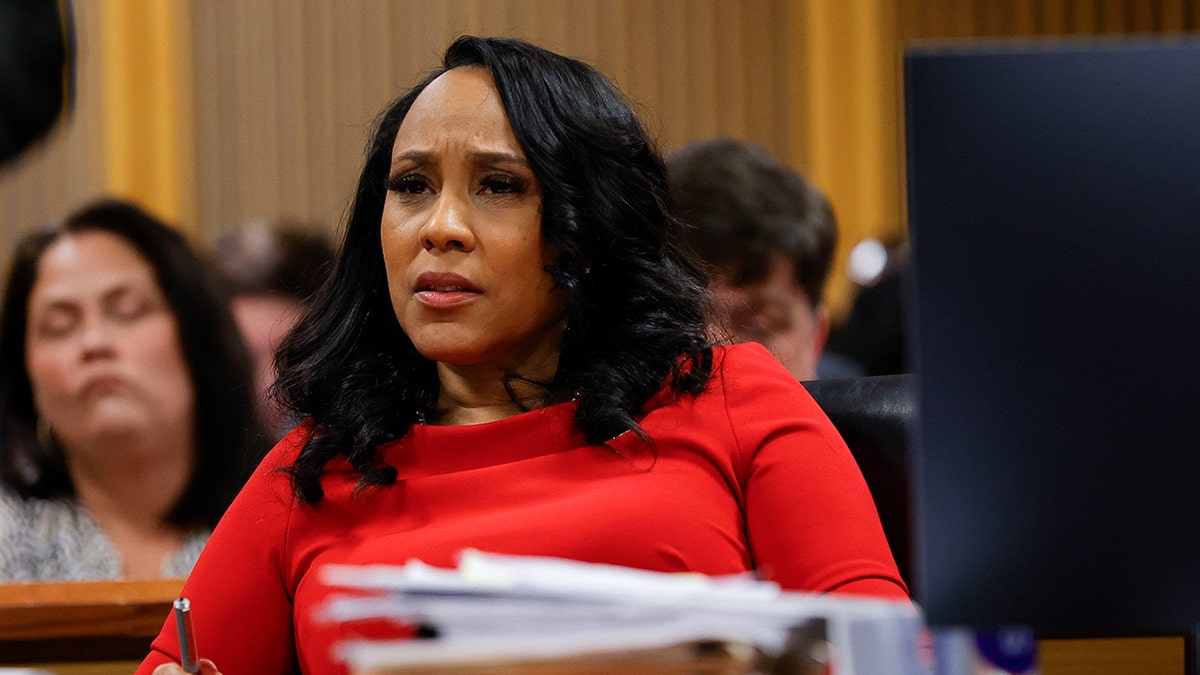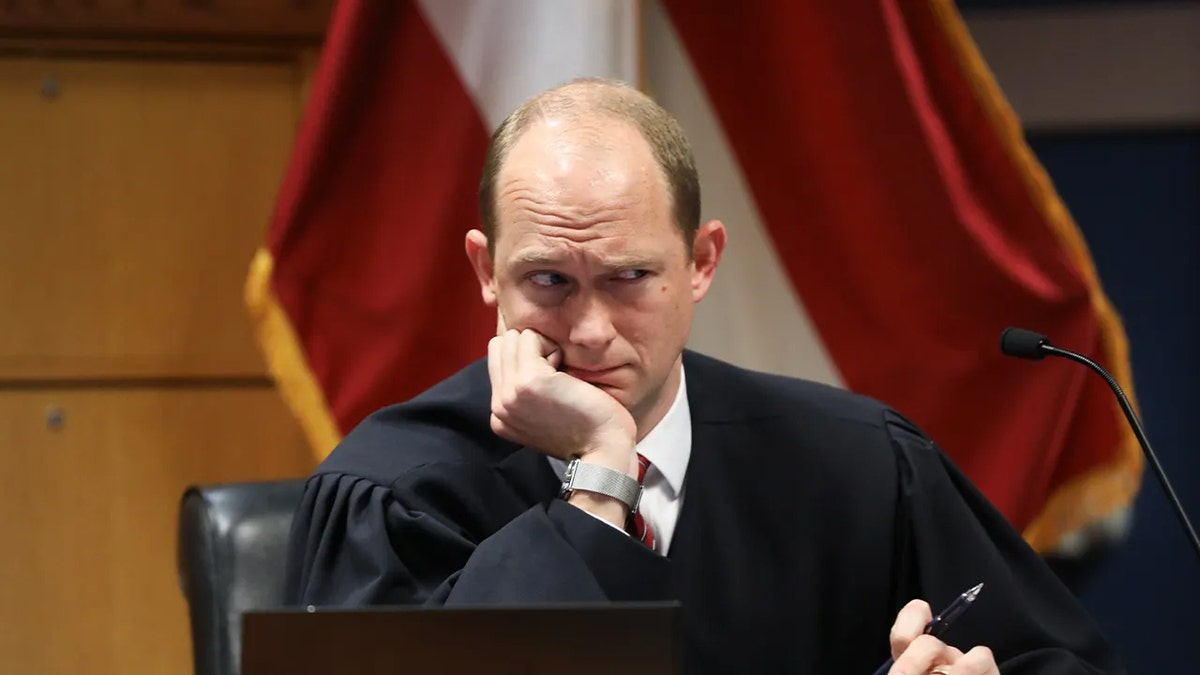Trump Georgia case: Five key takeaways from judge’s order giving DA Fani Willis an ultimatum
A Georgia judge on Friday ruled that embattled District Attorney Fani Willis needs to remove her ex-lover and special prosecutor from the case, or step aside herself, scolding her for “making poor choices” and having “tremendous lapse in judgment.”
In the 23-page order, Judge Scott McAfee said that lawyers for former President Trump and several co-defendants charged in the sweeping 2020 election interference case “failed to meet their burden of proving” an “actual conflict of interest in this case.”
But McAfee said that the established record of evidence “highlights the appearance of impropriety” that infects the prosecution team unless Wade is removed, or Willis herself steps aside.
Here are five key takeaways from the court order:
JUDGE RULES FANI WILLIS MUST STEP ASIDE FROM TRUMP CASE OR FIRE SPECIAL PROSECUTOR NATHAN WADE
1. Judge McAfee calls Willis’ behavior in court testimony ‘unprofessional’
McAfee denied the co-defendants’ motion to have Willis disqualified from the case, saying they lacked sufficient evidence that Willis “acquired a personal stake in the prosecution, or that her financial arrangements had any impact on the case.”
However, he added that his finding “is by no means an indication that the Court condones this tremendous lapse in judgment or the unprofessional manner of the District Attorney’s testimony during the evidentiary hearing.”
“Rather, it is the undersigned’s opinion that Georgia law does not permit the finding of an actual conflict for simply making bad choices – even repeatedly – and it is the trial court’s duty to confine itself to the relevant issues and applicable law properly brought before it,” he said.
Last month, Willis made a surprise court appearance during the two-day evidentiary hearing and, while on the witness stand, verbally sparred with lawyers for hours — at one point, prompting the judge to threaten to strike her testimony. She also raised eyebrows for appearing to be wearing her dress backwards.
2. Judge points to Georgia legislature, state bar and ethics board for ‘unanswered questions’ about Willis’ affair
The judge wrote in his order, “Other forums or sources of authority such as the General Assembly, the Georgia State Ethics Commission, the State Bar of Georgia, the Fulton County Board of Commissioners, or the voters of Fulton County may offer feedback on any unanswered questions that linger.”
“But those are not the issues determinative to the Defendants’ motions alleging an actual conflict,” he said.
A Georgia state senate special committee formed in January to investigate Willis has already held one hearing, in which attorney Ashleigh Merchant – who led the allegations in court against Willis – testified that Wade’s cellphone data indicated that he had made midnight trips to Willis’ condo before he was hired.
The Georgia House of Representatives also passed a bill earlier this year that would revive the Prosecuting Attorneys’ Qualifications Commission, which could be used as a way to oust Willis.
A Fulton County ethics board that was scheduled to hear complaints filed against Willis earlier this month backtracked after finding that it lacked jurisdiction. But complaints against both Willis and Wade are still pending before the Georgia state bar.
3. McAfee scolds Fani Willis’ public statements, including ‘improper’ church speech and ‘playing the race card’
Defendants had argued that Willis’ several public statements on the case were prejudicial. McAfee said that some of those comments, including Willis’ “unorthodox decision to make on-the-record comments, and authorize members of her staff to do likewise, to authors intent on publishing a book about the special grand jury’s investigation during the pendency of this case,” didn’t warrant her disqualification.
But McAfee said that Willis’ racially charged rhetoric about “playing the race card” during a speech at a church service was “legally improper.”
“Providing this type of public comment creates dangerous waters for the District Attorney to wade further into. The time may well have arrived for an order preventing the State from mentioning the case in any public forum to prevent prejudicial pretrial publicity,” he said.
4. Nathan Wade’s ‘willingness’ to ‘conceal’ his relationship with Willis
Judge McAfee said that Wade’s “patently unpersuasive explanation” about inaccurate statements he submitted to the court about his divorce “indicates a willingness on his part to wrongly conceal his relationship with the District Attorney.”
JUDGE DISMISSES SOME COUNTS AGAINST TRUMP IN FANI WILLIS ELECTION INTERFERENCE CASE

5. Key witness testimony that Willis and Wade’s affair began prior to his hiring is tossed
McAfee said he was “unable to place any stock” in the testimony of Terrance Bradley, the former law partner and Wade’s divorce attorney who was considered a key witness of the defense team trying to prove Wade had been romantically involved with Willis prior to his hiring.
Bradley, when pressed under oath, said he could not recall several details and timelines about conversations he had with former client Wade about Wade’s romantic relationship with Willis.
At one point, he was questioned about a text message exchange in which he said Willis’ relationship with Wade had “absolutely” started before he was hired in the DA’s office in 2021. But later in court he claimed he was “speculating” in those comments.
In his order on Friday, McAfee said Bradley’s “inconsistencies, demeanor, and generally non-responsive answers left far too brittle a foundation upon which to build any conclusions.”
FANI WILLIS WHO ‘RELISHED IN’ DONALD TRUMP PROSECUTION SHOULD BE REMOVED FROM CASE FOR ILLICIT AFFAIR: EXPERTS

“While prior inconsistent statements can be considered as substantive evidence under Georgia law, Bradley’s impeachment by text message did not establish the basis for which he claimed such sweeping knowledge of Wade’s personal affairs,” McAfee said.
Robin Yeartie, a former “good friend” of Willis and past employee at the DA’s office, testified in court that she had “no doubt” Willis and Wade’s relationship started in 2019, after the two met at a conference.
She testified to observing Willis and Wade “hugging” and “kissing” and showing “affection” prior to November 2021 and that she had no doubt that the two were in a “romantic” relationship starting in 2019 and lasting until she and Willis last spoke in 2022.
Judge McAfee in his order Friday said that “while the testimony of Robin Yearti raised doubts about the State’s assertions, it ultimately lacked context and detail.”
“[N]either side was able to conclusively establish by a preponderance of the evidence when the relationship evolved into a romantic one,” he added.
Still, the judge said that “an odor of mendacity remains,” and added that “reasonable questions about whether the District Attorney and her hand-selected lead SADA [special assistant district attorney] testified untruthfully about the timing of their relationship further underpin the finding of an appearance of impropriety and the need to make proportional efforts to cure it.”
It has not been announced whether Willis will choose to remove Wade from the case or step aside.
Read the full article Here


